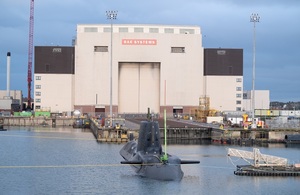HMS Agamemnon completes first dive
HMS Agamemnon, the sixth Astute Class submarine,has successfully completed her first underwater dive.

HMS Agamemnon as she dives for the first time at BAE Systems in Barrow.
HMS Agamemnon, the sixth Astute Class submarine, is another step closer to joining the UK’s in-service submarine fleet, following the successful completion of her first dive.
Shortly after being commissioned in the presence of His Majesty the King, the dive took place over two days and saw the boat submerged in water in the safety of a dock at BAE Systems in Barrow-in-Furness, under the control of her Royal Navy crew.
A trim dive is a key phase of a submarine’s testing and commissioning prior to her sailing for the first time and joining the in-service fleet. This consists of two activities:
- Basin dive
- Trim and inclining experiment
The basin dive is where many on-board systems are tested, including the ballast tanks which ensure the boat can surface. The trim and inclining experiment is to confirm the centre of gravity of the submarine and is measured by naval architects in both surfaced and submerged conditions.
To measure the centre of gravity of the submarine, 16 tonnes of lead weights are brought on board and moved side-to-side. This movement is also measured by hand using pendulums hung between decks, a method that has been used by naval architects since the 1700s. The results from this also calculate the precise weight and stability, showing how she will perform in-service.
The trials were conducted by BAE Systems and the ship’s staff, and activity was monitored by SDA and Ministry of Defence naval architects and overseers.
These are all key factors in her performance when she formally joins HMS Astute, HMS Ambush, HMS Artful, HMS Audacious and HMS Anson in service.
HMS Agamemnon was officially named in April 2024 and launched in October 2024; she is 97 metres in length and has a displacement of 7,400 tonnes. The Astute Class are the UK’s current attack submarines. They protect the UK’s nuclear deterrent from hostile activity and detection, whilst supporting global operations. They also contribute to protecting maritime task groups and providing global strategic intelligence and reconnaissance gathering.
Want to join this national endeavour? Apply for an SDA job today.